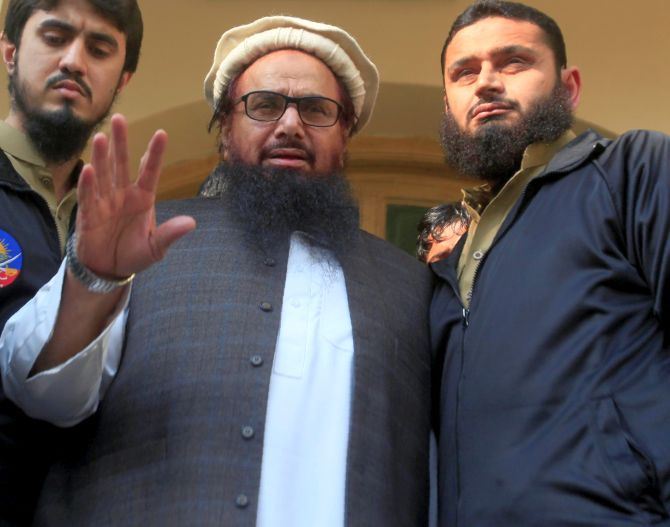If the parliamentary representation of radical Islamic parties goes up dramatically in 2018, what will this do to Pakistan's army?
Aditi Phadnis finds out.

IMAGE: Muhammed Saeed, the Lashkar-e-Tayiba terrorist, centre. Photograph: Mohsin Raza/Reuters
Two chance encounters with officials from Pakistan -- one serving, the other retired -- led to fascinating insights into the way the ruling classes are evaluating the recent setback to Nawaz Sharif and the Pakistan Muslim League-Nawaz's (PML-N) chances in the general elections ahead. What follows is a summary of the conversation.
Does it look as if there may be a coalition government in place in 2018?
Much too early to say, came the answer with a laugh, in itself suggesting doubts about the durability of the current configuration of Pakistan's national assembly (the lower house) where the PML-N has 188 out of 342 seats.
So could Imran Khan's Pakistan Tehreek-e-Insaf (PTI) step into the breach?
Punjab is not really the PTI's stronghold came the cautious reply. But so much can happen between now and then -- court cases, the healing of the rupture in the family...
The retired official was, for obvious reasons, much more forthcoming. If Nawaz Sharif and (his brother and Punjab chief minister) Shahbaz Sharif did not mend fences, it would be advantage Imran Khan, he said bluntly.
Shahbaz and clan did not attend one election meeting during the campaign -- they left it all to Maryam (Nawaz Sharif's daughter and political heir apparent), he said.
And if it is a coalition government in which the radical right is represented in large numbers, you can kiss the chances of a rapprochement with India goodbye.
The background was, of course, the by-election to Lahore's national assembly 120 constituency in September that saw Kulsoom Nawaz -- Nawaz Sharif's wife -- win the seat by a margin considerably narrower than the 2013 result.
The turnout was also lower despite a surge in the number of registered voters, suggesting a marked lack of enthusiasm for Sharif following corruption charges (which is why he was disqualified as PM).
The Pakistani media has analysed the by-election to within an inch of its life. The election commission is as prompt at releasing election data as it is in India.
According to EC figures, the PML-N lost 11 per cent of the vote while the PTI gained three per cent over the 2013 outcome.
Granted it is just one constituency; and in 2013 it was represented by the man who was going to be (and did become) the country's prime minister (so some attrition was inevitable).
But still, the result cannot be good news for the Sharifs.
The officials were much less concerned about the rise of the right wing than Pakistan's civil society.
There is much concern about the two 'independent' candidates -- one from the Tehreek Labbaik Ya Rasool Allah Pakistan (TLP), a party yet to be recognised by the election commission, and the other from Hafiz Saeed's Milli Muslim League.
TLP (which organised this weeks' protests that forced Pakistan's law minister Zahid Hamid to resign) was founded by Maulvi Khadim Hussain Rizvi, an Islamic scholar. Maulvi Khadim strongly supported Mumtaz Qadri who assassinated Punjab governor Salman Taseer in 2011 and vowed to get even with the PML-N for hanging Qadri.
His politics consists of vitriol against minorities living in Pakistan including Shias and Ahmediyas.
Saeed was possibly trying to professionalise and leverage the charitable work done by the Falah-e-Insaniyat, a front for the Jamaat-ud-Dawa, by creating a political party.
In the 2013 election, right-wing parties polled 1.8 per cent of the votes cast. In 2017 this figure has gone up to 10.4 per cent. On the face of it, this is a huge increase.
But the two Pakistanis pointed out that even for the purposes of a by-election, the right wing could not sink its differences and come together. Politics will do that to you.
So the Islamist tendency might be growing and deepening, but in terms of getting parliamentary voice, it still has a long path to traverse.
What does that tell us about the Pakistan army and the battles it is fighting?
At Kunar on the Afghanistan border and in Fata, it is trying to counter radical Islam by fighting the Tehrik-i-Taliban Pakistan.
In Kashmir, it is supporting it by providing training and logistical support to the Lashkar-e-Tayiba.
If the parliamentary representation of radical Islamic parties goes up as dramatically in 2018 as it has done in the by-election, what will this do to the army? Neither official was able to provide a coherent answer.
It is possible that these parties will remain divided and their influence will be kept in check or even neutralised by the PML-N.
But what if the PML-N itself is weakened? Nawaz Sharif's re-election as party chief suggests that the cadres are as worried about this possibility.
Sharif cannot go on forever and in his scheme of things, a succession plan is in place in which his daughter plays a big role.
But the PML-N seems to have realised that it is time to unite the party, not divide it.
In the months ahead, of all South Asian countries, it is Pakistan that is going to be the most interesting to watch.












 © 2025
© 2025